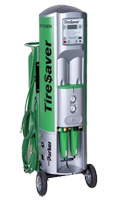How Nitrogen in Car Tires Works...
Nitrogen (N2) is AIR, more specifically, AIR is between 79% and 80% Nitrogen and is what we all breathe everyday. The remaining components in our breathable air is combined mostly of oxygen and CO2. Nitrogen is colorless, tasteless and (obviously) non toxic.
Carbon dioxide is a greenhouse gas which makes up about 0.038% of the Earth's atmosphere. CO2 has been, and continuse to be created (abundantly so) by the burning of fossil fuels. Combined with its long residence time in the atmosphere, this has made carbon dioxide the leading cause of man-made global warming.
As a nitrogen molecule is about 3% larger than an oxygen molecule, it does not escape through the tire wall as easily as oxygen can and therefore leaks at a much slower rate than oxygen. A car tire filled with Nitrogen is estimated to maintain the same pressure approximately three to four times longer than oxygen-filled tires. Proper inflation provides better fuel economy, tire specific handling properties, increased tire life and increased safety for your family. All of this being based on the tires maintaining the proper air pressure over a more consistent period of time.
Nitrogen (NO2) is a Dry, Inert Gas...
An Oxygen filled tire provides unwanted oxidation which serves to breakdown the rubber in tires, and corrodes (steel) wheels. Nitrogen is a harmless gas which does not react negatively with rubber tires and steel wheels, nitrogen filled tires reduces tire heat, therefore decreasing rolling resistance and or friction, and increasing fuel economy.
|

|







